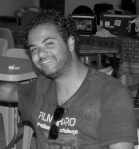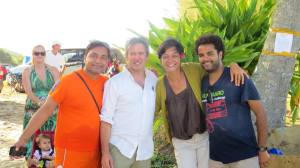: Conference
Film & Heritage: the Film Raro
 Last summer, I had the chance to attend a unique event in the South Pacific. The Film Raro paradise challenge took place in Rarotonga; the capital of the Cook Islands. The event consisted in bringing five film crews to make five film projects highlighting the island’s cultural and natural heritage.
Last summer, I had the chance to attend a unique event in the South Pacific. The Film Raro paradise challenge took place in Rarotonga; the capital of the Cook Islands. The event consisted in bringing five film crews to make five film projects highlighting the island’s cultural and natural heritage.
Five teams were selected from 2000 entries and they were from USA, New Zealand, Australia, the United Kingdom. The event was preceded by a class that introduced locals to the process of filmmaking.
Prior to the event, the locals assisted to a class about filmmaking and acting.
When the event started, each team had to finish both the production and post-production phase within 14 days. The teams and the projects were very diverse. From New Zealand, David Gould made a film about a young boy who gets touched by the wisdom of a local fisherman that changed his perception about the island. The Stone Brothers from California, adapted Scott Fitzgerald’s Offshore Pirate into a film about a girl who rediscovers her origins upon return to Rarotonga. The Australian team made a comedy about a million pound contest to find a corgi-dog that is supposed to have descended from Queen Elizabeth’s dogs. Karen Williams produced a documentary about ‘Mou Pirri’ a folkloric wedding song that originates from the Cook Islands.
The island lived on the Film Raro rhythm for two consecutive weeks. Rarotongans were involved in the filmmaking and post production process. They volunteered on sets, helped build sets, made props, prepared meals and were the majority of actors in the different films.
The event ended with the projects’ screening in front of a large audience which flocked from the different sides of the island.
I volunteered as a production assistant along with British Indian actor Dizzy Patel and Tahitian student Tiairani Drollet-le-Caill. We got the chance to rotate around film sets. This was an exciting learning experience for all of us. We got the chance to be involved in five films at the same time and see films getting made.
The different films made it into different film festivals and won prices allowing more visibility to the island of Rarotonga, its culture, history and heritage.
Event website: www.filmraro.com
 Nader was born in Tunisia and was a student of the MA in Heritage Management 2012/2013. His interest in cinema was nurtured at the Tunisian Federation of Film Societies. Nader holds a B.A in English Language and Literature from the Institute of Human Sciences of Jendouba. He also holds an MA in Cultural Anthropology from New Mexico State University. Nader wants to bring his interest in heritage management to film. In the last two years, he has been developing film projects both in his native country and abroad.
Nader was born in Tunisia and was a student of the MA in Heritage Management 2012/2013. His interest in cinema was nurtured at the Tunisian Federation of Film Societies. Nader holds a B.A in English Language and Literature from the Institute of Human Sciences of Jendouba. He also holds an MA in Cultural Anthropology from New Mexico State University. Nader wants to bring his interest in heritage management to film. In the last two years, he has been developing film projects both in his native country and abroad.
Let’s talk about illicit antiquities and private collectors
On February 24 of 2014, Initiative for Heritage Conservancy in collaboration with the Ephorate of Antique Shops and Private Archaeological Collections conducted a one-day conference regarding the work of the Ephorate and the protection of Greece’s cultural heritage. Moreover, the symposium was held in memory of the late previous director of the Ephorate, Dimitris Kazianis.
There were many subjects addressed in this symposium. The day started with speeches about the history of the Ephorate and the rich work of Mr. Kazianis during his directorship, then continued with speeches about the Greek and international legal framework about illicit antiquities, the role and the future of antique shops the private collector’s support to many of Greece’s museums, and many more.
The guest speakers were all from various backgrounds, but with a wealth of knowledge about Greece’s cultural heritage and the threats it faces in modern times. Some of the speakers are members of the Ephorate, such as Ms Elena Korka, an archaeologist and the current director of the Ephorate. IHC was represented by Dr. Evangelos Kyriakidis. Also in the symposium, many museums participated through their representatives, such as the Benaki Museum, the Museum of Cycladic Art, the Numismatic Museum and the Ilias Lalaounis Museum. The Greek office of ICOM was there, too. The list of the speakers was completed with archaeologists, conservators, lawyers, police officers, journalists and private collectors.
However, in this article I choose to address two subjects that raised many arguments and provoked various reactions.
One of them is the role of the private collectors. Although nowadays private collectors do not have a good reputation and are confronted skeptically, this was not the case few decades ago. Being a private collector had perks, like flexibility and quick decision making, thus the Greek state has at many times collaborated with private collectors to bring back antiquities from abroad when it was not possible for the state to act directly. Additionally, most of the cases of private collectors have given their collections as a legacy to the state and to various Greek museums.
But is this the proper way to protect and manage Greece’s cultural heritage? Indeed there are many threats and private collectors can send abroad artifacts as easily as they can bring them back. Therefore what is there to stop them? As most of them answered during the symposium, it is their love for Greece’s heritage, their national pride, and their own heritage. In order to close this subject, I will transfer here the words of one of the private collectors, who spoke at the symposium:
“If the Greek state could control and manage and preserve every little piece of Greek antiquities, then yes there is no place for us, but until this happens, we are the best option Greek society has.”
The second subject is the role of the general public. In the MA in Heritage Managementin our course for Public Archaeology, we have discussed various cases where the society has been left behind in favor of protecting antiquities and ancient monuments. Could it be that the living peoples’ heritage is of less importance than the dead ones’?
During the symposium many archaeologists have spoken about cases in which the general public aided the Ministry of Culture by indicating locations of monuments not easily reachable, such as up in the mountains or under the sea. For example, amateur divers have led the Ephorate of Underwater Antiquities to shipwrecks and submerged cities. There are numerous cases of those who demanded a reward in return for their help – according to Greek law, there is some kind of monetary reward in special cases – or they chose directly the most profitable, but illegal way of smuggling. In terms of cultural heritage, there are ways for the state to build a trustworthy relationship with the public; by educating the local society or informing and including them in the whole process of an excavation. If people know what is the true value of their heritage and its importance to their personal identity, they will be less likely to turn against it.
Overall, the symposium was a success with more than 200 people in attendance. I think it managed to communicate the responsibility each one of us has, when it comes to protecting our heritage.
 Maro Magoula is student of the MA in Heritage Management. Having studied Turkish and Modern Asian Studies in her undergraduate, she is interested in Ottoman history and culture, especially the history of her favorite city, Istanbul. Currently she is working in the Department of Educational Programs of the Initiative for Heritage Conservancy. Her interests include intangible heritage, new technologies, museum studies and public archaeology. Maro loves to travel and learn about new cultures.
Maro Magoula is student of the MA in Heritage Management. Having studied Turkish and Modern Asian Studies in her undergraduate, she is interested in Ottoman history and culture, especially the history of her favorite city, Istanbul. Currently she is working in the Department of Educational Programs of the Initiative for Heritage Conservancy. Her interests include intangible heritage, new technologies, museum studies and public archaeology. Maro loves to travel and learn about new cultures.
- 1
- 2


